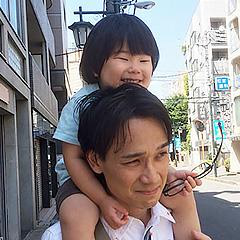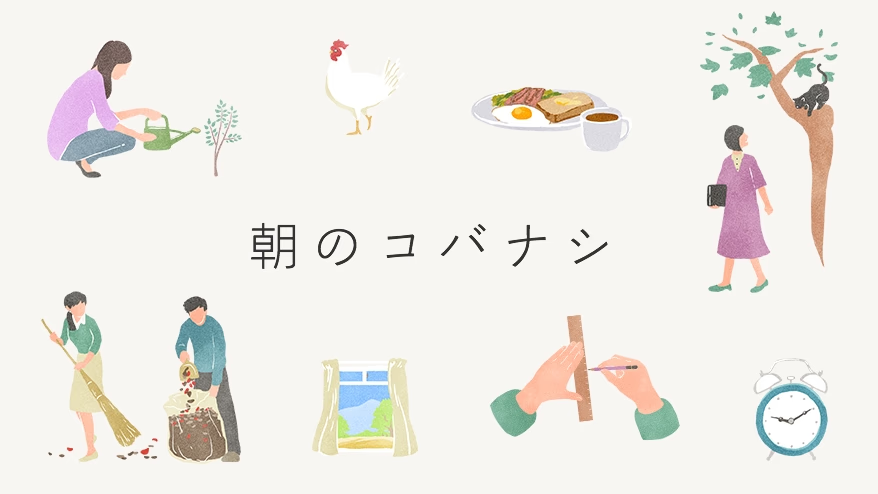It's already February. Things really go by quickly this time of year.
The Yoyogi office is bustling with activity as many new people have joined us. There have been many organizational changes this year, and days are busier than usual.
The snow from last month is still there, and the cold is still in the air. Even on days when the morning commute is a little depressing, we warm up by listening to the "words" of the morning assembly. At Monosus, our day begins with a little chat between executives, department heads, and leaders, who take turns each day.
This month we will be introducing a little bit of it on the Monosasu website.
The guests are Kojima, head of the Coding Factory Department, Tatsuta, head of the Marketing & Sales Department, and Onogi, head of the Design Department.
So, let's begin "Quote of the Day"...
Plan by year and date

- Presenter
Yoshihiro Tatsuta (Marketing Department Manager)
As the new year begins, many people are making plans for the coming year, but the most important thing about making plans is how to execute them. So, I would like to introduce some ways of thinking that will help you execute your plans reliably.
I heard this before, but when making plans, it's important to be aware of the "unit of time", as that will determine whether or not you can continue with it.
The best is "Sun".
Doing it every day is the most sustainable thing.
Next is "year".
It's best to do it once a year.
The reason for this is that while units of time such as "days of the week," "weeks," and "months" are man-made, only "days" and "years" are natural (a "day" is when the sun rises and sets, and a "year" is when the earth goes around the sun once), so they are the easiest to continue.
Do a little every day, or once a year.
If you are planning anything this year, try to keep this in mind.
Certainly, the things I decided to do every day have become habits, and I continue to do things like annual events. Oh, by the way, my "once a year" is to go to the pachinko parlor just once at the end of the year to ward off bad luck for the year. I used to bet 10,000 yen on the Arima Kinen, but recently I've been playing pachinko. The results are, well, I guess. I don't lose (laughs).
Thoughts from "Rent-a-Man"

- Presenter
Izumi Kojima (Director of the Coding Factory Department)
Have you heard of the service called " Old Man Rental "?
It's a service that lets you rent an older man for 1,000 yen per hour, and I thought it was pretty interesting.
You can basically ask the rented man to do anything, such as doing heavy lifting, giving advice, or lining up for tickets. The age group is mostly so-called "old men," and I guess many of them are retired. I thought there's still a lot that can be done.
In a company, retirement age = no longer a player, but by adding the framework of "Old Man Rental," retired people can become main players. There are various needs, and everyone has something they can do to meet those needs, so what is the framework in which they can be realized? That's what it's all about, I think.
New members of the Coding Factory Club (CF) may think, "I can't do anything right now," but that's just because they don't have many cards in their hand within the framework of "CF." I think there are many things I can do, based on the various experiences I've had up until now.
On the other hand, I want the senior members to think carefully about what they can do within the current CF framework and how to approach it. It's no good just having a card that says "I'm good at this."
Another important thing is to not be "humble" or "unnaturally reserved."
I hope that they will approach their work with an attitude of, "I can do this," rather than, "I can't do it."
What will the world be like in 2045?

- Presenter
Yu Onogi (Director of Design Department)
Ray Kurzweil, a leading AI developer at Google, has been creating a lot of buzz by announcing what he calls "what will happen by 2045." There are many things to cover, but to pick just one thing, he said that "3D printers will replace manufacturing."
3D printers themselves have become quite common, and in the United States, they have already succeeded in using 3D printers to make things other than car tires. If technology continues to evolve and costs fall, and this trend continues to accelerate, it is predicted that by 2045, manufacturing will disappear from the world.
Convenience stores will have 3D printers, and you'll be able to make anything you want with a 3D printer. Only the "materials" will be imported and exported, and manufacturing will be done locally. You'll be able to make anything you want just by going to a convenience store and "printing it out."
It's hard to imagine, and it seems like something from science fiction, but technology evolves exponentially. Previous technologies give rise to new technologies, and they progress bit by bit until one day there is an explosive leap forward.
Nowadays, the number of places called labs is increasing, and more and more places allow ordinary people to use laser printers and laser cutters, but I think that concepts such as manufacturing, DIY, and originality will also continue to change rapidly.
How will our work and the way we live change? I think it would be good to give it some thought.
Well, have a great day today.
Planning units, rental old men, the world of 2045. We have a selection of "Kobanashi" that will make you think about your future.
So, what kind of stories will come out tomorrow?
It's so much fun.
Well, have a great day everyone today.

